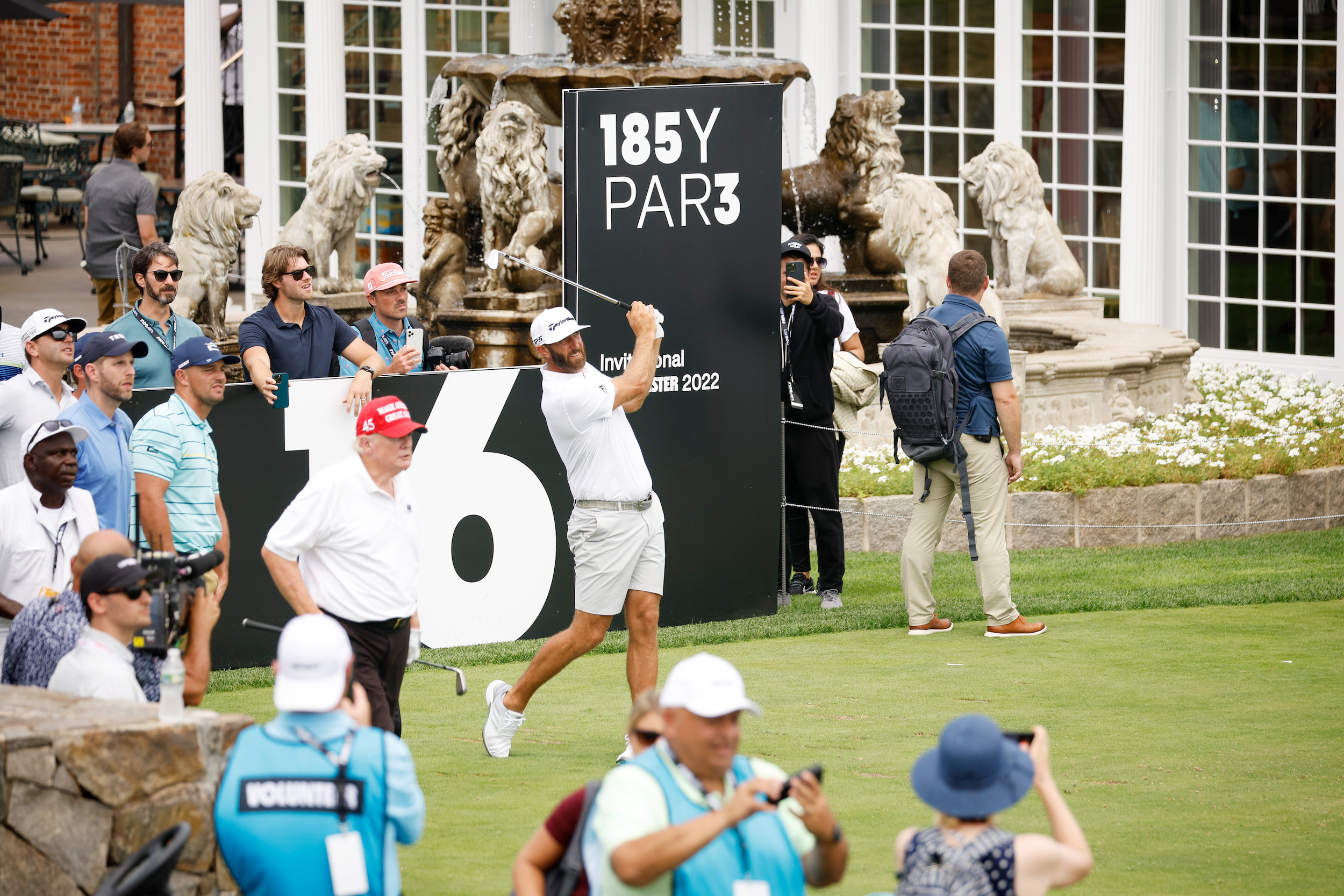The PGA Tour responded Monday to an antitrust lawsuit filed last week by a group of 11 LIV Golf pros, accusing the hoary old organization of engaging in anticompetitive behavior when it acted to exclude members of the Saudi-financed breakaway league from future Tour events. The complaint, filed August 3 in the U.S District Court of Northern California, says that the PGA Tour is threatening both the livelihoods of LIV pros and the success of "LIV Golf’s otherwise-promising launch," and asks for an emergency injunction preventing the PGA Tour from excluding LIV pros from the Tour's annual season-capping playoff, scheduled this year to commence on August 11, in Memphis.
The PGA Tour's response hypes its own role in "driving media and sponsorship money" into the sport by allowing golf professionals "to pool their media rights," and argues that it could not function in this way without a commitment from its members, who directly benefit from this arrangement, "not to play in, and thereby contribute their media rights to, non-TOUR golf events held in North America that conflict with PGA TOUR events." As a renowned expert on antitrust matters—so far in this blog I have spelled the word "antitrust" several times without any typos whatsoever—I am tempted to bang the gavel and say the PGA Tour is being super-duper non-competitive here, on the grounds that you cannot fool me simply by using the word "conflict" instead of the word "compete" in your employee handbook. However, as I am not technically the assigned judge on this matter, I will defer to the Honorable Beth Labson Freeman, whose gavel-wielding skills I am bound by standards of professional decorum to respect when it comes to parsing the antitrust what-have-yous of this lawsuit.
Legal intricacies which I understand super well but will not get into right now notwithstanding, the lawsuit does seem to have triggered a silly and enjoyable role-reversal among the parties. The 11 LIV players, who in most cases left the PGA Tour because they were lured by enormous, unprecedented upfront payments and financial guarantees, now have to argue that their livelihoods are being seriously threatened by actions that exclude them from a handful of events with total purses worth a fraction of what some of them have already made in LIV Golf income. The consequences, they say, would be "substantial and irreparable, and a temporary restraining order is needed to prevent the irreparable harm that would ensue were they not to be able to participate." Their argument requires that they position the essentially bottomless resources of the Saudi Public Investment Fund as insufficient to mount a credible golf tour, and to keep their players fed and sheltered, in a world dominated by the PGA Tour. This would seemingly contradict the explicit pitch of LIV Golf, which is that the essentially bottomless resources of the Saudi Public Investment Fund will allow the organization to immediately mount a credible golf tour, worthy of the world's top pros, who will be fed and sheltered beyond their wildest dreams.
The case that these 11 LIV pros, including Phil Mickelson and Bryson DeChambeau, are making—that LIV Golf and its pros are starving, and without access to PGA Tour events the LIV Golf players will wither and die—is a case that you might expect the PGA Tour itself to make, implicitly and explicitly, at every turn, as it fights off this new threat. But for now, while there is an antitrust lawsuit where they are accused of using their dominant position in North American professional golf to strangle a competitor and its workers, it suddenly behooves the PGA Tour to make the case that LIV Golf is actually kicking major butt and has nothing to worry about. "With access to nearly unlimited funding through the PIF, LIV has been able to compete for elite players quickly and successfully and operate without consideration of profitability," boasts the PGA Tour, on behalf of their direct competitor. "During its short existence, LIV has established itself as a competing golf tour, having already successfully recruited more than twenty PGA TOUR members," including the 11 plaintiffs in the lawsuit. At times the PGA Tour's response to the suit reads like it was swiped directly from a LIV Golf recruiting pitch:
Far from struggling to recruit golfers, LIV’s CEO stated in a televised interview with Tucker Carlson just two days before Plaintiffs filed this lawsuit that LIV is oversubscribed for golfers and that “the list gets longer, longer, longer for the players that want to” join LIV. It has also been reported that players joining LIV have received tens-of-millions of dollars, and in some cases hundreds-of-millions of dollars, in guaranteed payments to play for LIV. Plaintiff Phil Mickelson reportedly received $200 million to join LIV, and other prominent TOUR members such as Plaintiff Bryson DeChambeau and Dustin Johnson have reportedly received more than $100 million each.
The response goes on to note that LIV Golf eschews what the PGA Tour describes as professional golf's "long-earned reputation as a meritocracy" in favor of a system in which players are guaranteed what the Tour considers "exorbitant prize money," through purse shares and large team bonuses. LIV Golf, the response notes, plans to expand to 14 events in 2023, and to offer up nearly half-a-billion dollars in total prize money. I would like to note here that this is not an advertisement for LIV Golf!
It's fun for me to imagine an undecided mid-tier golf pro, reading the antitrust complaint and deciding that LIV Golf must be in terrible shape, if high-profile and outrageously overcompensated pros like Phil Mickelson and Bryson DeChambeau feel that being excluded from the playoffs of a tour they willingly and publicly dumped would cause "substantial and irreparable" harm to their very livelihoods. And then to imagine that same pro reading the PGA Tour's response and being told by the very organization with whom he hopes to establish a lucrative career that its breakaway competitor is firmly established, endlessly resourced, healthy, growing, and throwing around fistfuls of cash to any player who can secure a spot on one of its dipshit teams. Who to believe? The LIV Golf pros who say they cannot survive without the PGA Tour? Or the PGA Tour, which insists that LIV Golf is like heaven for golf pros?
This much is certain: The conflict between these two organizations is going to get extremely stupid before the dust finally settles, if it ever does. The PGA Tour's full response to the complaint is embedded below, for your perusal.






